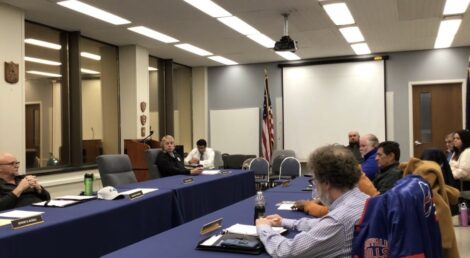Health Officials Note More Issues Arising Post COVID

Pictured are members of the Chautauqua County Board of Health. Photo by Gregory Bacon
MAYVILLE – Chautauqua County’s Public Health Department is continuing its focus on COVID-19, while trying to address other health issues in the county.
During this week’s Board of Health meeting, Public Health Director Christine Schuyler noted the staff held a “reflective, rebuilt retreat.” The goal was to evaluate the department’s strengths and weaknesses, as well as see how staff members are doing personally.
Schuyler said the COVID-19 workload is not overwhelming like it used to be, however, there are a host of other health issues that need to be dealt with. “What we’re seeing coming at us at every other end is tremendous, as far as our STD (sexually transmitted disease) rates, the increase in tobacco, e-cigarettes, obesity, alcohol use, drugs, overdoses,” she said.
One new goal Schuyler has is for every newborn child that is born or lives in Chautauqua County to get a personal visit from a public health nurse. “I think it’s really important that we go back to the old fashioned public health nurse model,” she said.
Schuyler noted that they’re seeing more women giving birth who got late prenatal care or none at all. They also are seeing women who are not first-time mothers who need assistance as well.
In terms of funding, Schuyler said the state has increased its support. In Chautauqua County, the base grant for public health work increased from $650,000 to $750,000. The state also is allowing reimbursements for fringe benefits up to 50%.
“Traditionally, in public health state aid you could only get reimbursed for 36% of someone’s salary so it’s always been on local governments’ dime to cover 100% of fringe benefits,” she said.
She believes sustainable funding sources are better than grants because grants can take a lot of work to apply for and at times the legislature has rejected grants.
Schuyler noted how the legislature initially delayed accepting a wastewater treatment grant to test for COVID and how last month county lawmakers rejected a $75,000 grant to address vaccine hesitancy, with the aim being to increase vaccination among children as well as other minority groups.
Health Board President Dr. Lillian Ney expressed her disappointment for the grant being rejected. “It was not just for COVID, it was for all vaccinations, which have gone down for kids,” she said.
Ney said she’s willing to help advocate for the county’s Health Department in the future. In March, she and fellow health board member Tom Erlandson spoke at the legislature meeting urging for passage of the wastewater grant program. “I do feel strongly that if something is in jeopardy and it’s important that we have a responsibility to be there (at the legislature meetings) to try to explain,” she said.
Other board members, too, said they’re willing to appear at either committee or full legislature meetings if county lawmakers have questions about the grants or the programs offered.
Board member Mark Tarbrake, who used to be a county legislator, noted that elected officials get pressure from the public to vote certain ways. “If I was passionate about a bill, I wasn’t going to change my mind but some legislators change their mind and they have the right to do that,” he said.
Erlandson said sometimes that pressure can come from fellow legislators. “There’s also pressure in the caucuses, not just from the public, but from your colleagues in your caucus,” he said.
Ney, who was a member of the Jamestown City Council in the past, said she understands the pressure elected officials are under, but doesn’t want to see the legislature make uneducated decisions. “We just have to do the best we can to educate,” she said.





